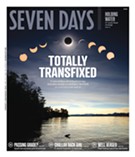Published May 21, 2008 at 11:28 a.m.
Vermont boasts the most breweries per capita in the U.S. No fewer than 16 brewers and brewpubs service its roughly 450,000 citizens of drinking age, and every one of those establishments is independently owned. In a national marketplace dominated by chains and franchises, it's remarkable for a state to host so many small-player entrepreneurs. And it's no accident - it's written into state law. Among other ownership restrictions in the alcohol industry, Vermont law forbids the existence of a "tied house" - that is, a business that both manufactures beer and sells it off-site at restaurants, pubs or other similar retail businesses it owns. Crafted to prevent monopolies from taking hold, such laws are among the strictest in the nation.
But in Vermont, apparently, not strict enough. On March 24, Governor Douglas signed a bill (H.93) that extends existing law by prohibiting both in- and out-of-state brewers from owning retail venues in Vermont. And at least one local brewpub proprietor thinks the state has gone too far.
To Rob Downey, co-owner of American Flatbread in Burlington, the Beer Producers' Interest in Retail Liquor Licenses law is just the latest in a series of obstacles that might hold back Vermont brew businesses rather than stimulate them. "The law signed in March just pushes Vermont into an extreme situation that doesn't really benefit the brewers or consumers anymore," Downey says. "It was pushed hard by the VBA [Vermont Brewers Association], but it is a remedy for an illusion - namely, that Budweiser will swoop into the state and start opening restaurants. That will never happen."
Downey is quick to specify what will happen: Beer he makes at Burlington's American Flatbread won't go to his two other restaurants in Waitsfield and Middlebury. "And this law also discourages us from doing smaller projects in Vermont," he adds, "in places like White River Junction or Stowe, markets that could be made more viable if we could make our own beer from a central brewing facility and ship it and sell it to our restaurants. How exactly does preventing that help beer business?"
Downey contrasts Vermont with states such as Oregon, which modified its craft-brewery laws in the mid-1980s to allow manufacturers producing fewer than 200,000 barrels a year to own restaurants. He wonders why Vermont seems so set against fostering what he terms an "open market, in which you can have direct access to the consumer rather than having your beer funneled through a distributor."
Greg Noonan, owner of Burlington's Vermont Pub & Brewery, has a very different take on the Oregon beer laws and their consequences. He points out that Portland-based McMenamins Pubs and Breweries currently wields a mini-monopoly in that state: It owns 58 percent of the brewpubs and brewery outlets. Meanwhile, independent ownership in Oregon has dwindled to 24 percent.
Noonan says people in the industry jokingly refer to McMenamins as "McMinimals," "in part because of how little investment they seem to make in brewing as opposed to marketing. I just can't see that being a good thing here, and I sure wouldn't want to be a small brewer starting out in a system that allowed chains to dot the landscape."
Though production out of Magic Hat Brewing Company's South Burlington factory (100,000 barrels a year) dwarfs that of competitors such as Trout River Brewing Co. in Morrisville and Stonecutters Brewhouse in Barre, its sympathies still seem to be with the start-ups. The company's "Supreme Dreamer and Schemer," Stacey Steinmetz, says she supports the new law.
"I can appreciate the point Rob [Downey] is making, of course," Steinmetz explains. "And I admit that the restrictions add up to a pretty aggressive form of protectionism, but they also help drive new ideas, and keep this state unique."
*************
There's nothing new about the idea of selling high-alcohol-content beer in Vermont's pubs and restaurants. In fact, local brewers have been pushing it for some time. (Current law limits the sale of beers exceeding 8 percent alcohol to state-licensed liquor stores.) Though at press time H.94 had yet to be signed by Governor Douglas, the bill enjoys widespread support, unlike the more divisive H.93. Craft brewers are looking forward to the opportunity to introduce an entirely new class of beers - containing up to 16 percent alcohol - to drinkers who have sampled a Belgian tripel or a Russian Imperial stout. Those connoisseurs may wonder why they can't sip their favorite beers in a restaurant, as they would a 12-percent-alcohol wine.
"Many conjure an image of cheap malt liquor when they hear about higher-alcohol beers," says Steve Parks, owner and lead instructor of the American Brewers' Guild in Salisbury and head brewer at Otter Creek Brewers in Middlebury. "But we're actually talking about beer styles that are very sophisticated and one that we are going to charge a premium price for."
Parks adds that, because liquor store staff often knows little about how to store and preserve high-alcohol beers, local buyers may not have experienced them in peak condition. "Whether it's barley wine or Belgian beers, stores will put them somewhere behind the counter, not marketed or well kept or distributed in a way that preserves quality," he says. "These are beers that can accentuate an entire meal and can be sipped just like a dinner wine, but they need care."
Matt Nadeau, owner of the Rock Art Brewery in Morrisville, has been chomping at the bit to sell his "Vermonster" barley wine (10 percent alcohol) more aggressively, and awaits the governor's signature with his order list.
"We are one of the few states left with the 8 percent limitation," Nadeau says. "What [H.94] allows us to do is to brew a true representation of high-alcohol styles, not watered-down versions. It's a real opportunity for us."
More By This Author
Speaking of...
-

Waterbury’s Craft Beer Cellar Gets a New Name — and a Bar
Feb 27, 2024 -

Video Guide: Things to Do in Vermont During the Eclipse
Jan 25, 2024 -

Winooski’s Vermont Homebrew Supply to Close
Jan 16, 2024 -

Morrisville’s Lost Nation Brewing Charts a Path Through a Changing Beer Landscape
Jan 9, 2024 -

Q&A: Howard Fisher Delivers Meals on Wheels With a Side of Good Cheer
Dec 20, 2023 - More »
Comments
Comments are closed.
From 2014-2020, Seven Days allowed readers to comment on all stories posted on our website. While we've appreciated the suggestions and insights, right now Seven Days is prioritizing our core mission — producing high-quality, responsible local journalism — over moderating online debates between readers.
To criticize, correct or praise our reporting, please send us a letter to the editor or send us a tip. We’ll check it out and report the results.
Online comments may return when we have better tech tools for managing them. Thanks for reading.













































